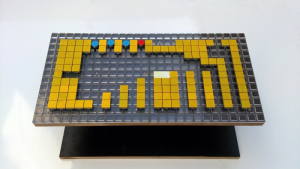If you’ve ever played the popular puzzle game “Tilt,” you’re already somewhat familiar with Aaron Becker’s research. Along with his research team, Becker, an assistant professor of electrical and computer engineering in the Cullen College, created a video explaining his research that has been accepted to the 31st International Symposium on Computational Geometry.
The video, “Tilt,” shows how custom environments can be built to gives tiny robots on the micro- and nano-scales independence. “We also build elements such as a reconfigurable display and reproduce digital circuits,” Becker said. “Along the way, we've proven how you can take a children's game called Tilt, that uses sliding blocks that all move in the direction you tilt the game board, and use it make a very slow digital computer.”
Becker says the long term goals of the research are to steer small drug-carrying robots inside the human body, as well as commanding nano-robots to fabricate tools inside what he calls “micro-factories.”
“These are big aims and will require years,” he said. “But our present research tells us how to independently control swarms of these nano-robots and get them to work together.”
The Computational Geometry Week (CG Week 2015) is the premier international forum for advances in computational geometry and its many applications. This year’s event will take place at TU Eindhoven, the Netherlands, in June.
Watch Becker’s “Tilt” video here.
